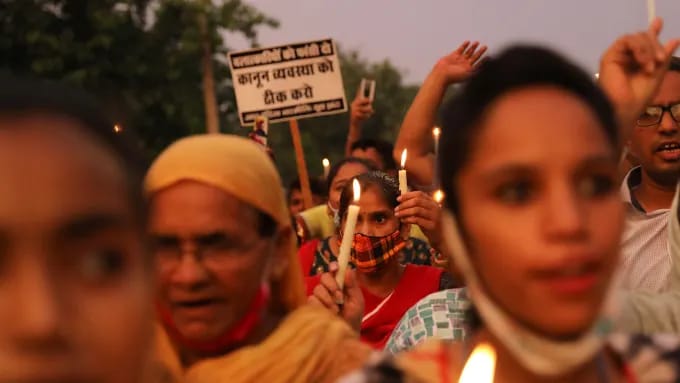A judge in India rejected a woman's complaint accusing her husband of engaging in 'unnatural sex.'
According to the judge, it's not against the law for a husband to make his wife participate in sexual activities under Indian law.
The recent ruling in the Madhya Pradesh High Court highlighted a legal gap in India, where marital rape by a husband is not considered a crime if the wife is over 18, as reported by CNN.
The woman reported to the police that her husband engaged in 'unnatural sex' with her in 2019, shortly after their marriage, under Section 377 of India’s penal code, according to the Madhya Pradesh High Court order.
This offense involves non-consensual 'carnal intercourse against the order of nature with any man, woman or animal,' and was previously used to prosecute same-sex couples before homosexuality was decriminalized in 2018 by the Supreme Court.
The woman also claimed that this act occurred 'multiple times' and that her husband threatened to divorce her if she told anyone. She eventually came forward after confiding in her mother, who encouraged her to file a complaint in 2022.
On the other hand, the husband's lawyer argued that any 'unnatural sex' between the couple wasn't a crime because they were married.
In his decision, Justice Gurpal Singh Ahluwalia emphasized India’s marital rape exemption, which remains from the British rule era over 70 years after independence.
The judge stated, “When rape includes insertion of penis in the mouth, urethra or anus of a woman and if that act is committed with his wife, not below the age of fifteen years, then the consent of the wife becomes immaterial … Marital rape has not been recognized so far.”
In a groundbreaking ruling in 2017, India’s Supreme Court increased the minimum marital consent age from 15 to 18.
The woman also accused her in-laws of mental and physical harassment “on account of non-fulfilment of demand of dowry,” the court order said. A trial is pending.
Ahluwalia's statements have once again raised concerns about how India treats women, who continue to confront violence and discrimination in the predominantly patriarchal society.
While India has made progress in enacting laws to protect women, the reluctance to criminalize marital rape means that women are not adequately safeguarded, according to lawyers and campaigners.
Based on the 2019-2021 National Family Health Survey by the Government of India, 17.6% of over 100,000 women aged 15-49 surveyed said they couldn't refuse sex to their husbands, and 11% believed that husbands were justified in hitting or beating their wives if they declined.
Women in India who allege rape have some possible legal options against their husbands. For instance, they can pursue a restraining order under civil law or bring charges under Section 354 of India’s Penal Code, which covers sexual assault apart from rape, and Section 498A, which addresses domestic violence.
Marital rape: Court rules against wife who sued husband for forced 'unnatural sex'.
Lawyers say that these laws can be interpreted differently and judges can use them to give prison sentences for sexual assault in situations where a married woman has claimed rape, although many do not do that, according to lawyer Karuna Nundy who spoke to CNN earlier.
A study in 2022 found that many married women are also disregarded when they attempt to report to the police.
According to a study that looked at records from three Mumbai public hospitals between 2008 and 2017, out of 1,664 rape survivors, the police did not file any rape cases. Among these women, at least 18 reported marital rape to the police, including 10 women who claimed rape by a former partner or husband.
The report stated that four women were explicitly told by the police that they could not take any action because marital rape is not a crime.
Advocates have been trying to change the law over time, but they face opposition from conservatives who argue that state intervention could harm the tradition of marriage in India.
A legal challenge to the law has been moving through the country's courtrooms, with the Delhi High Court delivering a divided opinion on the matter in 2022. As a result, lawyers have filed an appeal in the country's Supreme Court, but it is still pending.



